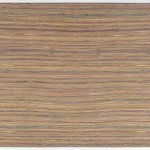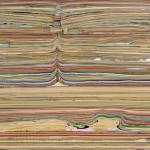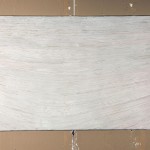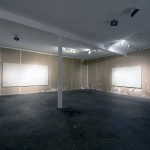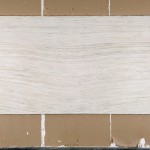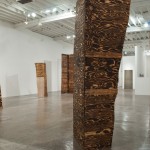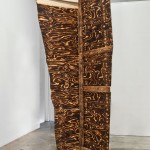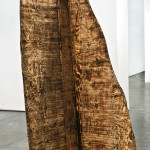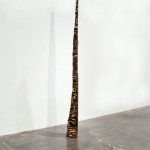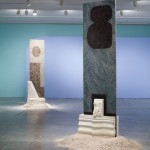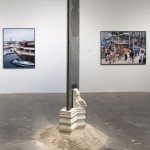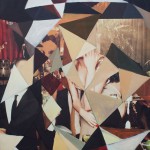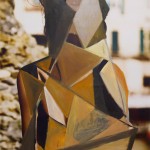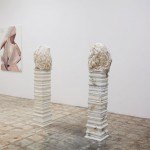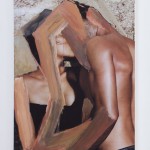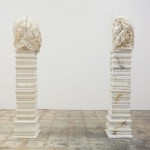Project Description
Biography
Loriel Beltran (Venezuelan,1985) often deals with infiltrating existing systems, and with materials that have a history. In the Damaged Works series, he used shipping crates that had previously transported art and were later discarded by galleries and museums. The crates were cut to resemble ruins or unfinished architecture, and then burnt using a torch to reveal the intricate wood grain, creating a pattern of the intersection between nature and culture. Damaged Work #3 highlights how materials can be repurposed in order to disperse abundance. The piece showcases the ability to re-envision a material that was discarded due to excess, and transform it into an entirely new object.
Artist Statement
My most recent work attempts to expand on what is usually known as institutional critique; more specifically Michael Asher’s view of “rendering systems visible”. I have previously made work that directly references this notion, for example, by removing 10 years worth of accumulated layers of paint from the walls of Locust Projects in Miami, and turning them into paintings; or by making monumental sculptures out of discarded shipping crates previously used to transport pieces of art. In my most recent work I have expanded my scope to include social institutions such as Architecture/Real Estate and Advertising. These function as solid ground for critical reflexion of larger social concerns and expand on institutional critique by inquiring beyond the art system into our social framework as a whole.
I approach my work as a materialist in the sense that I often let the process and production of the work be visible, and unlike many engaged in today in institutional critique and other branches of conceptual art, I embrace formalist choices, specifically those relating to the history of painting. These choices are informed by the process in which every work is created but not limited to it, and expands continuously as I build a vocabulary of forms.
Biografia
Loriel Beltran nació en Venezuela en 1985. Beltran trabaja con sistemas infiltrados existentes, y con materiales que tienen una historia. En su serie “Obras Dañadas,” Beltran usó cajas de transporte que habían sido usadas previamente para transportar arte y que luego fueron descartadas por galerías y museos. Las cajas fueron cortadas para que parecieran ruinas o arquitectura sin terminar, y después fueron quemadas usando una antorcha para revelar la madera intricada, creando un diseño de intersección entre la naturaleza y la cultura. Obra dañada #3 refleja como los materiales pueden ser reutilizados en orden de dispersar su abundancia. La pieza muestra la habilidad de re imaginar un material que fue descartado por exceso, y trasformado en un objeto totalmente nuevo.
Declaracion de Artista
Mis obras más recientes intentan expandir en lo que es usualmente conocido como critica institucional: más específicamente la opinión de Michael Asher en “sistemas de representación visible”. Yo he trabajado previamente en obras que referencian esta noción directamente. Por ejemplo, quitando 10 años de capas acumuladas de pintura a las paredes de Locust Projects en Miami, y volviéndolas a obras de pinturas; o haciendo esculturas monumentales hechas de cajas de trasporte que habían sido previamente usadas para transportar obras de arte. En mis obras más recientes, he expandido mi alcance a incluir instituciones sociales como arquitectura/ bienes raíces y publicidad. Estas funcionan como tierra solida para una reflexión critica de mayor preocupación social y expanden la critica institucional indagando más allá del sistema del arte a nuestro marco social.
Me acerco a mi trabajo como un materialista en el sentido que yo casi siempre dejo que el proceso y la producción del trabajo sea visible y a diferencia de muchos comprometidos en critica institucional y otras ramas de arte conceptual hoy en día, yo adopto opciones formalistas, específicamente esas relacionando la historia a la pintura. Estas opciones están informadas por el proceso y en el que toda obra esta creada pero no limitada a eso, y se expande continuamente mientras construyo un vocabulario de formas.
Contact
305 815 5070
- “Process/Processed 1″ 2006-2008 Acrylic paint on wood panel 96″ x 72”
- “Process/Processed 1” Detail
- “Wall 3- Labor paintings” 2009 Acrylic paint, plaster, paper on wood panel 96″ x 72″
- “Wall 2- Labor paintings” 2009 Acrylic paint, plaster, paper on wood panel 128″ x 72″
- “Falsework” 2011 Installation view front room Fredric Snitzer Gallery, Miami, FL
- “Damaged Work #7″ 2011 Burnt wood (Originally a shipping crate for the transportation of art) 120″ x 38″ x 42” Miami, FL
- “Damaged work #1″ 2011 Burnt wood (Originally a shipping crate for the transportation of art) 94″ x 35″ x 46″ x 38″ x 42”
- “Damaged work #8″ 2011 Burnt wood (Originally a shipping crate for the transportation of art) 120″ x 52″ x 56″ transportation of art) 94″ x 35″ x 46”
- “New Work Miami” 2012 Installation View Miami Art Museum, Miami FL transportation of art) 120″ x 52″ x 56″
- “Unknown Kitchen Monument” 2012 Found granite countertop, cast concrete 100” x 26” x 22”
- “Bacardi” 2012 Oil on found poster 62” x 40”
- “Unknown modeli” 2012 Oil on found poster 62” x 40”
- “Rococo Chanel” 2013. Installation View Guccivuitton, Miami FL
- “Figure,” 2013. Oil on archival inkjet print, 40” x 60”
- “Primitive Couple 1,” 2013. Oil on archival inkjet print. 22” x 30”
- “Rococo Chanel,” 2013. Installation View Guccivuitton, Miami FL

